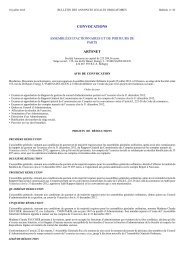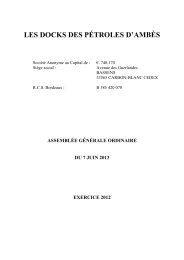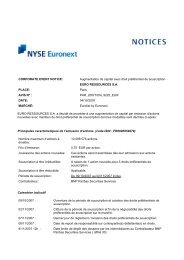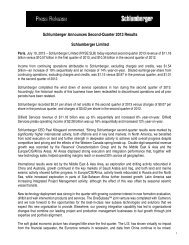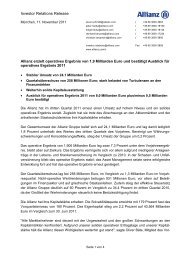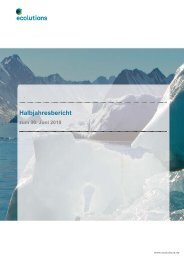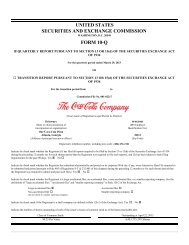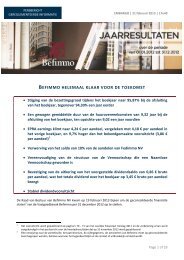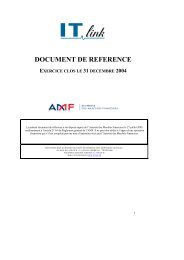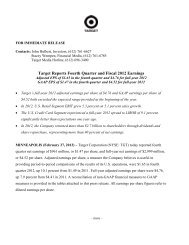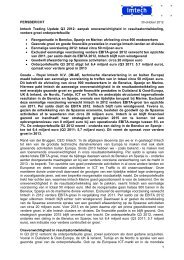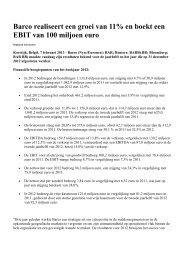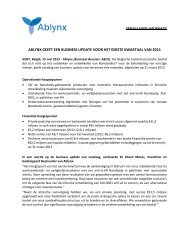2006 Annual Report
2006 Annual Report
2006 Annual Report
Create successful ePaper yourself
Turn your PDF publications into a flip-book with our unique Google optimized e-Paper software.
ownership could prevent potential customers from<br />
buying residential products or reduce the prices they<br />
are willing to pay;<br />
3 Residential construction may be subject to warranty<br />
and liability claims, and the costs of resolving such<br />
claims may be significant; and<br />
3 If the pace of sales is slower than we anticipate or sales<br />
prices are lower than projected, it may become more<br />
difficult to convince future hotel development partners<br />
of the value added by our brands.<br />
Damage to or other potential losses involving properties that<br />
we own, manage or franchise may not be covered by insurance.<br />
We have comprehensive property and liability insurance policies<br />
with coverage features and insured limits that we believe<br />
are customary. Market forces beyond our control may<br />
nonetheless limit the scope of insurance coverage that we<br />
can obtain and our ability to obtain coverage at reasonable<br />
rates. Certain types of losses, generally of a catastrophic<br />
nature, such as earthquakes, hurricanes and floods or terrorist<br />
acts, may be uninsurable or too expensive to justify insuring<br />
against. As a result, we may not be successful in obtaining<br />
insurance without increases in cost or decreases in coverage<br />
levels. In addition, in the event of a substantial loss, the insurance<br />
coverage we carry may not be sufficient to pay the full<br />
market value or replacement cost of our lost investment or<br />
that of hotel owners, or in some cases could result in certain<br />
losses being totally uninsured. As a result, we could lose some<br />
or all of the capital we have invested in a property, as well as<br />
the anticipated future revenue from the property, and we<br />
could remain obligated for guarantees, debt or other financial<br />
obligations related to the property.<br />
Risks relating to acts of God, contagious disease, terrorist<br />
activity and war could reduce the demand for lodging, which may<br />
adversely affect our revenues. Acts of God, such as hurricanes,<br />
earthquakes and other natural disasters and the spread of<br />
contagious diseases, such as Avian Flu and SARS, in locations<br />
where we own, manage or franchise significant properties<br />
and areas of the world from which we draw a large number of<br />
customers can cause a decline in the level of business and<br />
leisure travel and reduce the demand for lodging. Actual or<br />
threatened war, terrorist activity, political unrest, civil strife and<br />
other geopolitical uncertainty can have a similar effect. Any<br />
one or more of these events may reduce the overall demand<br />
for hotel rooms, timeshare units and corporate apartments or<br />
limit the prices that we are able to obtain for them, both of<br />
which could adversely affect our profits.<br />
A failure to keep pace with developments in technology could<br />
impair our operations or competitive position. The lodging and<br />
timeshare industries continue to demand the use of sophisticated<br />
technology and systems, including those used for our<br />
reservation, revenue management and property management<br />
systems, our Marriott Rewards program, and technologies we<br />
make available to our guests.These technologies and systems<br />
must be refined, updated and/or replaced with more advanced<br />
systems on a regular basis. If we are unable to do so as quickly<br />
as our competitors, or within budgeted costs and time frames,<br />
our business could suffer. We also may not achieve the benefits<br />
that we anticipate from any new technology or system, and a<br />
failure to do so could result in higher than anticipated costs or<br />
could impair our operating results.<br />
An increase in the use of third-party Internet reservation<br />
services could adversely impact our revenues. Some of our hotel<br />
rooms are booked through Internet travel intermediaries,<br />
such as Travelocity.com®, Expedia.com®, and Priceline.com®,<br />
serving both the leisure and, increasingly, the corporate travel<br />
and group meeting sectors. While Marriott’s Look No<br />
Further® Best Rate Guarantee has greatly reduced the ability<br />
of these Internet travel intermediaries to undercut the published<br />
rates at our hotels, these intermediaries continue their<br />
attempts to commoditize hotel rooms by aggressively marketing<br />
to price-sensitive travelers and corporate accounts<br />
and increasing the importance of general indicators of quality<br />
(such as “three-star downtown hotel”) at the expense of<br />
brand identification. These agencies hope that consumers<br />
will eventually develop brand loyalties to their travel services<br />
rather than to our lodging brands. Although we expect to<br />
continue to maintain and even increase the strength of our<br />
brands in the online marketplace, if the amount of sales<br />
made through Internet intermediaries increases significantly,<br />
our business and profitability may be harmed.<br />
Changes in privacy law could adversely affect our ability to<br />
market our products effectively. Our Timeshare segment, and<br />
to a lesser extent our other lodging segments, rely on a variety<br />
of direct marketing techniques, including telemarketing,<br />
email marketing and postal mailings. Any further restrictions<br />
in laws such as the Telemarketing Sales Rule, CANSPAM Act,<br />
and various U.S. state laws regarding marketing and solicitation<br />
or international data protection laws that govern these<br />
activities could result in concern about the continuing effectiveness<br />
of telemarketing, email and postal mailing techniques<br />
and could force further changes in our marketing<br />
strategy. If this occurs, we may not be able to develop adequate<br />
alternative marketing strategies, which could impact<br />
the amount and timing of our sales of timeshare units and<br />
other products. We also obtain access to potential customers<br />
from travel service providers or other companies with whom<br />
we have substantial relationships and market to some individuals<br />
on these lists directly or by including our marketing<br />
message in the other company’s marketing materials. If the<br />
acquisition of these lists were outlawed or otherwise<br />
restricted, our ability to develop new customers and introduce<br />
them to our products could be impaired.<br />
Operating risks at our synthetic fuel operations could reduce<br />
the tax benefits generated by those facilities. The Company<br />
owns four synthetic fuel production facilities. The Internal<br />
Revenue Code provides tax credits for the production and<br />
sale of synthetic fuels produced from coal through 2007.<br />
Although our synthetic fuel facilities incur significant losses,<br />
those losses are more than offset by the tax credits generated,<br />
which reduce our income tax expense. Problems related<br />
to supply, production and demand at any of the synthetic<br />
fuel facilities, the power plants and other end users that buy<br />
synthetic fuel from the facilities, the suppliers of the treatment<br />
agent or the coal mines from which the facilities buy<br />
coal could diminish the productivity of our synthetic fuel<br />
operations and adversely impact the ability of those operations<br />
to generate tax credits.<br />
MARRIOTT INTERNATIONAL, INC. <strong>2006</strong> | 13



